Over the course of the past decade one of the things that permeate the internet around New Years are reading goals. People make wild proclamations on how many books they intend on reading and companies like GoodReads help facilitate it. Reading goals are 100% useless and it feels like people are just flexing and grunting at the gym bragging, about how much they press. Reading should be enjoyable and goals are anything but.
New Years is the time when people start saying things like “I intend on reading 50 books by the end of the year” or “I will read every book by (insert author here). Reading goals are normally synonymous with a resolution, but resolutions should be focused on changing habits rather than goals, so I would say if you are looking to read more, think about what things you can change about your day to day to accomplish that, rather than setting an arbitrary quota.
GoodReads is one of the companies that are responsible in the boom of reading goals. They organize them every year and have plugins for emails, forums and Facebook. GoodReads does this under the guise of reading, but they chiefly do it to get more pageviews, traffic and people visiting their site. This fulfills their mandate of getting more authors and publishers to pay them for direct advertising. Have a reading goal list full of romance and erotica authors? Be prepared to have a ton of books marketed to you via newsletters and when your browsing the GoodReads site. Reading goals are big business.
There is an abundant amount of research on the negative effects of external controls (such as rewards, deadlines, and assigned goals) on intrinsic motivation. In other words, when motivation to do an activity comes from outside, via rewards or mandates, it tends to undermine people’s interest in doing that activity for its own sake. This decline in motivation ultimately affects enjoyment, creativity, and even performance.
Michael Kozlowski is the editor-in-chief at Good e-Reader and has written about audiobooks and e-readers for the past fifteen years. Newspapers and websites such as the CBC, CNET, Engadget, Huffington Post and the New York Times have picked up his articles. He Lives in Vancouver, British Columbia, Canada.

